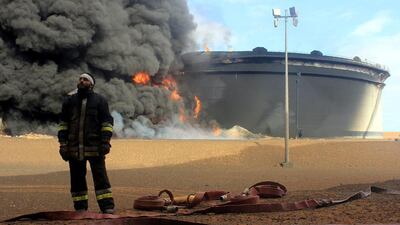Following a regional trend of instability, the political situation in Libya is increasingly out of control as extremist groups such as ISIL are taking advantage of the security chaos brought on by the Arab Spring to establish footholds in the pivotal north African country. Without a comprehensive peace agreement and a return to normality, more extremist groups will flock to Libya and use the country as a base of operations.
Writing in the Sharjah-based daily Al Khaleej, columnist Sadeq Nasher commented on recent policy discussions about the prospects of another foreign intervention in Libya in an attempt to restore stability.
Such an intervention would target ISIL, as the organisation is one of the major sources of instability in North Africa, threatening neighbouring countries such as Tunisia and Egypt. Both countries are still recovering from the Arab Spring and ISIL poses an ever-growing threat, the writer noted.
There is great fear in both Egypt and Tunisia about direct foreign intervention in Libya, because some believe that it could dramatically exacerbate tensions that could spill across borders, he said. However, allowing ISIL to prey on Libya without striking it would be dangerous for the entire international community from Libya to Egypt and Tunisia as well as Algeria and Sudan, the writer argued.
“Arab citizens are hoping other countries will not be plagued with similar instabilities as in the countries of the Arab Spring, especially in light of the devastation and destruction that led to hundreds of thousands of dead, injured and displaced as a result of the uprisings.”
Nasher observed that the political agreement reached in Al Sukhairat in Morocco between warring Libyan parties is a step in the right direction. The parties must be pressured into implementing the agreement so as to avoid Libya falling into a maze of war and direct intervention by Italy and other foreign countries.
Such an event, the writer argued, would bring the country back to square one and ease any progress made since the removal of the country’s dictator, Muammar Qaddafi.
Arab and western countries have let ISIL control the course of events, Nasher argued. They have ignored the complexity of the Libyan situation.
Now, Libyans are asked to renounce violence and favour reconciliation and the quest for solutions that will spare the country the risk of external intervention, Nasher concluded.
In Abu Dhabi’s Al Ittihad, the sister Arabic-language newspaper of The National, Hamad Al Kaabi wrote that operations to “decontaminate the Libyan soil from the plague of terrorism” and to eradicate it in all its forms, would require foreign support, since extremist groups had taken advantage of the country’s precarious situation. The Libyan situation is of utmost importance to all Arabs without exception, but it also is of crucial importance to the West, Al Kaabi noted. Libya’s geographic and geopolitical role is vital to the continent and the region.
Fighting ISIL in Libyan territory has become a necessity because the extremist group has its eyes set on oil facilities, making its way through the coastal city of Sirte to give way to cross-border smuggling operations in the south, Al Kaabi explained. It was up to the Libyan military to establish emergency plans and counterterrorism should no technical or logistical help come from the international community, he said.
There was no other realistic choice that would bring stability back to Libya, but to train legitimate forces and supply them with weapons, equipment and the means of combating terrorism. Only this would contribute to maintaining the security of the entire region and ensure the exit of Libya itself from the cycle of violence and looting that ISIL and other terrorist groups have led it to, the writer concluded.
*Translated by Carla Mirza
cmirza@thenational.ae

